Why Python Libraries are the Secret Sauce of Productive Programming Library?
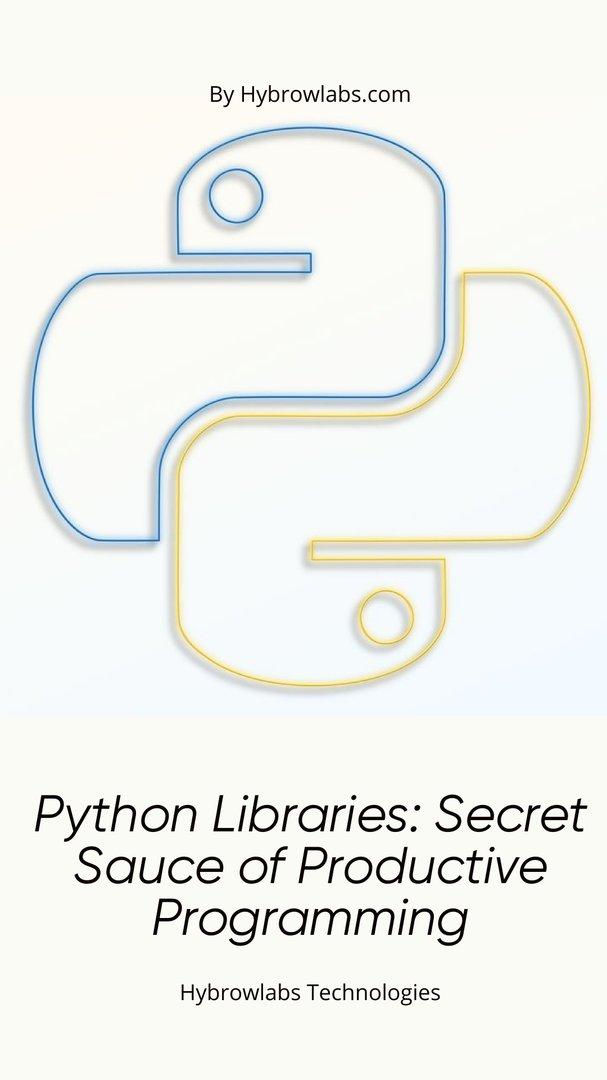
Python is a widely-used programming language that offers a vast number of libraries to its users. Python libraries are collections of pre-written code that can be imported and used in Python programs. These libraries provide ready-made functions, classes, and modules that can be used to perform specific tasks, such as data analysis, web development, or scientific computing.
The importance of libraries in Python programming cannot be overstated. They save time and effort by providing pre-written code that can be used to perform common tasks. Without libraries, programmers would have to write all the code from scratch, which would be time-consuming and error-prone.
Python libraries are considered the secret sauce of productive programming because they:
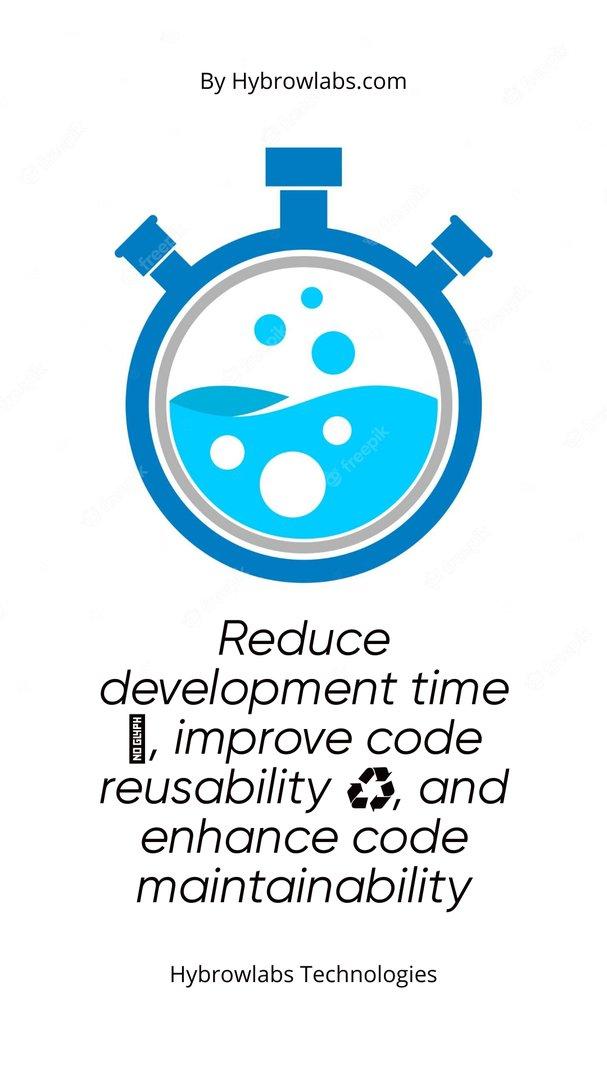
1. Reduce development time:
Python libraries are designed to simplify programming tasks, reduce errors and improve code quality. By leveraging pre-written code, developers can speed up development time and focus on solving the business problem at hand rather than reinventing the wheel.
2. Improve code reusability:
Python libraries promote code reusability by encapsulating commonly used code into a single module that can be imported into multiple projects. This approach enables developers to save time and effort by not having to rewrite the same code repeatedly for different projects.
3. Enhance code maintainability:
Python libraries provide well-documented, well-tested code that is easy to read and understand. This approach improves code maintainability, reduces bugs and makes it easier for developers to collaborate on a project.
4. Extend functionality:
Python libraries offer a wide range of functionalities that can be easily incorporated into a project. For example, libraries such as NumPy, Pandas, and Matplotlib are commonly used for data analysis, whereas libraries such as Flask and Django are used for web development.
5. Foster innovation:
Python libraries provide a platform for developers to innovate and create new solutions without having to start from scratch. By building on existing libraries, developers can create new functionalities and applications that would have been difficult or time-consuming to develop from scratch.
What are the must-have Python libraries in your toolkit?
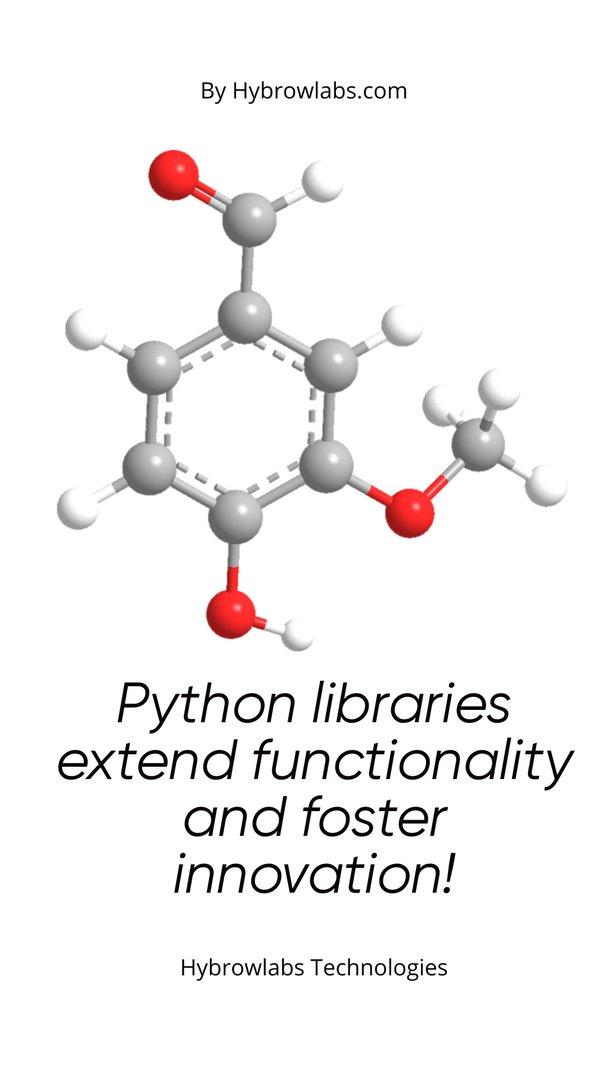
1. NumPy - The Swiss Army Knife of Scientific Computing with Python Library:
NumPy stands as a potent scientific computing library for Python users, providing a plethora of beneficial utilities and functionalities that enable the manipulation of large numerical arrays and matrices. The extent of NumPy's capabilities has earned it the reputation of being the Swiss Army Knife of scientific computing within the Python ecosystem. The most notable attributes of NumPy are its provision of vectorized operations, broadcasting and advanced indexing support. These features ensure developers can conduct complex calculations and manipulations on voluminous datasets, making it an indispensable instrument for various scientific computing applications.
2. Pandas - Data Wrangling and Analysis Made Easy Library:
Pandas has emerged as a well-liked data wrangling and analysis library in the Python programming language. It offers user-friendly tools and functions that enable the effortless import, manipulation, and analysis of data in various formats such as CSV, Excel, SQL, among others. With its robust and instinctive application programming interface (API), Pandas has become the preferred option for data scientists and analysts who require a tool to perform tasks such as data cleaning, transformation, and analysis. Some of Pandas' notable features include its ability to handle intricate data structures, time series data, and missing data. Consequently, Pandas streamlines the data wrangling and analysis process, enabling users to promptly and effectively derive insights from their data.
3. Matplotlib - Data Visualization That Speaks Volumes Library:
Matplotlib stands as a comprehensive library for visualizing data in the Python programming language. It offers an extensive range of tools and functions that facilitate the creation of high-quality charts, graphs, and plots that enable the clear communication of data insights. Matplotlib's versatility and flexibility have contributed to its popularity in various fields, including scientific research, finance, and business analytics. Some of the critical capabilities of Matplotlib include its provision of support for a broad range of plot types, interactive visualizations, and customizable features. With Matplotlib, developers can create sophisticated and interactive visualizations that convey complex data insights to a diverse audience effectively.
4. TensorFlow - The Magic Ingredient for Machine Learning and Deep Learning Library:
TensorFlow is an advanced library for machine learning and deep learning in the Python programming language. Developed by Google, TensorFlow provides a plethora of powerful tools and functions for constructing and training intricate neural networks to perform predictions and classifications on extensive datasets. Due to its efficient and scalable computational architecture, TensorFlow is widely used for both research and production applications. Some of the notable features of TensorFlow include support for diverse machine learning models, distributed training, and the ability to execute on both CPU and GPU architectures. In general, TensorFlow is considered the secret ingredient for machine learning and deep learning, empowering developers to build complex models and make accurate predictions on intricate datasets.
5. Beautiful Soup - Web Scraping with Grace and Ease Library:
Beautiful Soup is a widely used Python library for web scraping. It provides an intuitive and elegant API to extract data from HTML and XML documents, facilitating automated data collection tasks from websites. With its powerful parsing capabilities, Beautiful Soup can handle diverse web page structures and content types, including tables, forms, and multimedia elements. Moreover, Beautiful Soup supports various techniques for searching and filtering the scraped data, making it an excellent tool for organizing and cleaning the extracted information. In summary, Beautiful Soup empowers developers to perform web scraping tasks with agility and simplicity, providing a productive way to extract valuable insights from the web.
6. Pygame - Game Development Made Fun and Easy Library:
Pygame is a sought-after library for game creation in the Python programming language. This library offers a user-friendly assortment of tools and functionalities that facilitate the creation of games with captivating graphics and sound effects. By leveraging Pygame, game developers can create 2D games that offer both excitement and interactivity. The library is inclusive of an extensive range of game development features, comprising input management, collision detection, sprite animation, and sound playback. Furthermore, Pygame boasts cross-platform compatibility, thereby enabling developers to deploy games seamlessly across various operating systems. In conclusion, Pygame simplifies game development, enabling developers to focus on the creative components of game design without concern for the technical intricacies of game programming.
7. Flask - Web Development That Gets Straight to the Point Library:
Flask is a lightweight web development library written in Python, with a sharp focus on simplicity and effectiveness. This library offers a straightforward and user-friendly framework for building web applications that can be effortlessly deployed to production environments. By leveraging Flask, developers can quickly create and deploy web applications without the burden of a full-featured web framework. Flask encompasses a diverse range of web development functionalities, including URL routing, template rendering, request handling, and more. Furthermore, Flask's modular architecture makes it effortless to enhance with third-party libraries and tools. All things considered, Flask is an optimal option for developers who desire to create web applications that prioritize efficacy and can be deployed rapidly and seamlessly.
8. Django - Web Development That Goes the Extra Mile Library:
Django is an influential web development library that is written in Python, with a remarkable emphasis on delivering a feature-rich web framework. This comprehensive library empowers developers to build intricate and robust web applications with ease. Django comprises a broad array of features and tools for web development, which includes an Object-Relational Mapping (ORM) system, a templating engine, an admin interface, and much more. With Django, developers can swiftly develop web applications that are both scalable and secure enough to handle a substantial volume of traffic. Additionally, Django's extensive documentation and large community make it facile to learn and utilize. To sum it up, Django is an ideal option for developers who yearn to build web applications that surpass the norm in terms of complexity, scalability, and security.
9. Requests - The Simplest Way to Make HTTP Requests in Python Library:
Requests is a user-friendly and uncomplicated library for executing HTTP requests in Python. It features an intuitive API that streamlines the process of sending HTTP/1.1 requests and receiving responses from web servers. By utilizing Requests, developers can promptly and effortlessly extract data from websites, access APIs, and communicate with web services. Requests supports a diverse range of HTTP methods, including GET, POST, PUT, DELETE, and others, in addition to offering authentication and cookie handling capabilities. Furthermore, Requests can proficiently handle HTTP errors and exceptions, making it a dependable tool for retrieving web resources. Ultimately, Requests stands as the most straightforward approach to making HTTP requests in Python, providing a practical and efficient mechanism for accessing and manipulating web data.
10. PyAutoGUI - Automate Your GUI Tasks Like a Pro:
PyAutoGUI is a library for Python that enables developers to automate GUI tasks with ease. It offers a straightforward API that allows for automating mouse movements, keyboard inputs, and other GUI interactions. This library is particularly useful for automating repetitive tasks such as form filling, data entry, and testing, saving developers valuable time and effort. PyAutoGUI also offers features for taking screenshots, controlling the clipboard, and detecting on-screen object positions. Another significant advantage of PyAutoGUI is its cross-platform compatibility, making it a versatile tool for automating GUI tasks across different operating systems. Overall, PyAutoGUI provides developers with a professional-grade solution for automating GUI tasks, freeing up more time for creative and high-priority work.
Conclusion:
In conclusion, Python libraries are essential for productive programming as they provide pre-written code and functionalities that can be easily integrated into projects, allowing developers to save time and effort. This article highlighted ten must-have Python libraries for supercharging projects:
- NumPy is a versatile library for scientific computing in Python, providing a variety of functions for working with arrays and matrices.
- Pandas simplifies data wrangling and analysis by providing high-performance data structures and tools for data manipulation.
- Matplotlib is a powerful library for data visualization, allowing users to create a wide range of graphs and plots.
- TensorFlow is a widely used library for machine learning and deep learning, providing a framework for building and training neural networks.
- Beautiful Soup is a library for web scraping, allowing users to extract data from HTML and XML documents with ease.
- Pygame simplifies game development in Python by providing a range of tools and functionalities for creating games.
- Flask is a lightweight web framework for Python, providing tools for building web applications quickly and easily.
- Django is a robust web framework for Python, providing a full-stack solution for building complex web applications.
- Requests simplifies making HTTP requests in Python, providing an intuitive API for interacting with web resources.
- PyAutoGUI allows users to automate GUI tasks, such as clicking, typing, and moving the mouse, making it easier to perform repetitive tasks.
Overall, these libraries are just a few examples of the many powerful tools available to Python developers, and leveraging them can significantly improve productivity and the quality of projects. Utilizing Hybrowlabs Python Development services can further enhance the development process and help create robust applications using these essential Python libraries.
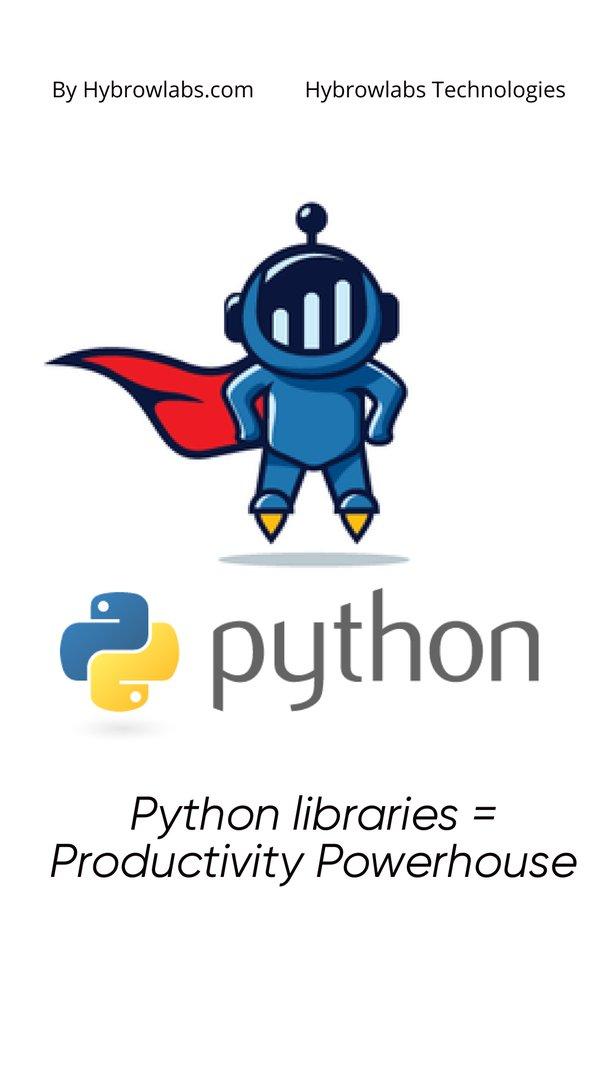
FAQ’s
1. What are the benefits of using NumPy in Python, for example?
The sophisticated Python package NumPy offers a large range of functions for working with arrays and matrices and is designed for scientific computing. Faster calculations, effective memory management, and support for a broad range of mathematical operations are just a few benefits of using NumPy.
2. What are some benefits of utilising Requests in Python to send HTTP requests?
A straightforward and user-friendly Python library for sending HTTP requests is called Requests. A few benefits of using Requests include its user-friendly API, support for a variety of HTTP methods, management of cookies and authentication, as well as error and exception handling.
3. Can Python developers create sophisticated web apps with Django?
Indeed, Django is a potent Python web development library that offers a feature-rich web framework for creating intricate and durable web applications. An ORM, a template engine, an admin interface, and many other web development features and tools are included in Django.
4. Can Python web scraping be done with Beautiful Soup?
Yeah, the Python web scraping module Beautiful Soup is well-liked. It makes it easier to automate data collecting operations from websites by offering a straightforward and attractive API for extracting data from HTML and XML documents.
5. What are a few advantages of utilising TensorFlow in Python for machine learning and deep learning?
In order to design and train sophisticated models, a variety of tools and functions are provided by the potent Python library TensorFlow for machine learning and deep learning. Effective computation, support for remote computing, and a flexible and modular architecture are some advantages of utilising TensorFlow.



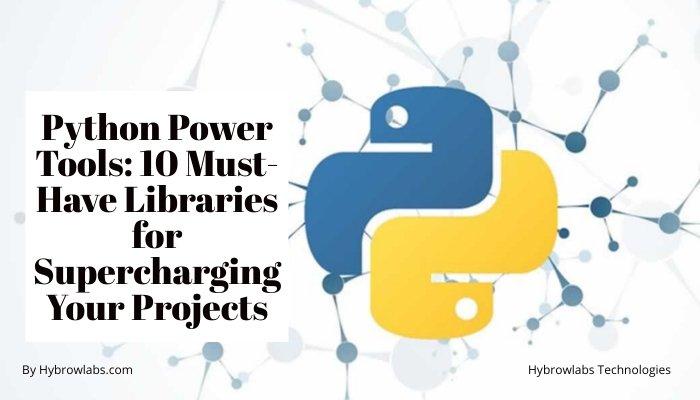


a3dc85.jpg)

.jpg)
fd8f11.png)

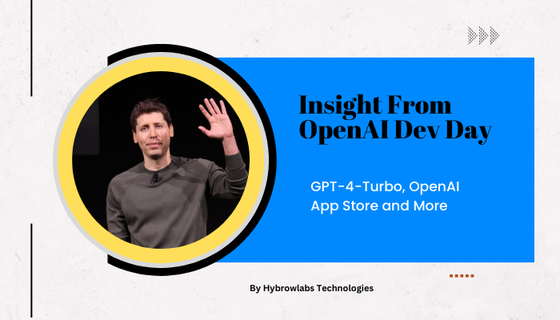
.jpg)
.jpg)